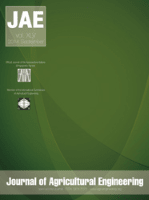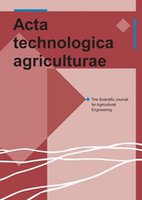
Journal of Agricultural Engineering
Scope & Guideline
Unlocking Knowledge for Sustainable Agricultural Development
Introduction
Aims and Scopes
- Precision Agriculture Technologies:
The journal emphasizes the development and application of precision agriculture technologies, including automated systems, sensors, and data analytics to optimize farming practices and enhance crop yields. - Sustainable Agricultural Practices:
Research on sustainable practices that minimize environmental impact while maximizing productivity is a core focus, including studies on resource management, waste reduction, and energy efficiency. - Mechanization and Equipment Design:
The journal covers advancements in agricultural machinery and equipment design aimed at improving operational efficiency and reducing labor costs in various agricultural sectors. - Environmental Monitoring and Modeling:
A significant area of research involves modeling environmental factors affecting agriculture, including climate impacts, soil health, and water management strategies. - Biotechnology and Crop Improvement:
The journal also addresses the integration of biotechnology in agriculture, focusing on genetic improvements, pest management, and disease resistance in crops.
Trending and Emerging
- Automation and Robotics in Agriculture:
There is a growing trend in research on automation and robotics, with studies focusing on robotic systems for planting, harvesting, and monitoring crops, enhancing efficiency and reducing labor demands. - Artificial Intelligence and Machine Learning Applications:
The application of AI and machine learning in agriculture is increasingly prominent, with research devoted to predictive analytics for crop management, disease detection, and yield forecasting. - Climate Resilience and Adaptation Strategies:
Research focusing on climate resilience is on the rise, examining how agricultural systems can adapt to changing climatic conditions and mitigate adverse effects on food production. - Data-Driven Decision Making:
Emerging studies emphasize the use of big data and analytics in agriculture, promoting data-driven decision-making processes that enhance operational efficiency and sustainability. - Smart Irrigation Technologies:
Innovations in smart irrigation systems, utilizing sensors and real-time data for irrigation management, are gaining attention, reflecting a shift towards water conservation and efficiency.
Declining or Waning
- Traditional Farming Techniques:
Research related to conventional farming methods has seen a decline as the journal shifts towards more innovative and technology-driven approaches to agriculture. - Chemical Fertilization Studies:
There is a noticeable reduction in publications focused solely on chemical fertilizers, possibly due to a growing emphasis on sustainable practices and organic farming. - Basic Soil Science:
Basic soil science topics have diminished in favor of applied research that integrates soil management with advanced technologies and environmental considerations. - Conventional Irrigation Methods:
Studies centered around traditional irrigation methods are waning, reflecting an increased interest in precision irrigation techniques and water-saving technologies.
Similar Journals

Romanian Agricultural Research
Empowering Researchers to Transform Agricultural PracticesRomanian Agricultural Research is a prominent academic journal dedicated to advancing the field of agricultural science with a specific focus on agronomy and crop management. Published by the NATL AGRICULTURAL RESEARCH & DEVELOPMENT INST in Romania, this journal has established itself as an important resource within its discipline, evidenced by its Q3 ranking in the Agronomy and Crop Science category for 2023. With its ongoing publication since 2008, the journal provides a platform for researchers and professionals to disseminate their findings and share innovative practices that address the challenges faced in agricultural development. Although it operates under a non-open access model, Romanian Agricultural Research commits to rigorous peer-review processes, ensuring the high-quality content that enhances the academic community’s knowledge base. The journal's objective is to foster dialogues surrounding sustainable agriculture, improve crop yield, and contribute to the enhancement of agricultural practices globally. Researchers, professionals, and students will find this journal to be an invaluable repository of knowledge and a catalyst for future agricultural innovations.

Acta Technologica Agriculturae
Pioneering Research at the Intersection of Agronomy and EngineeringActa Technologica Agriculturae is an esteemed open-access journal published by SCIENDO, based in Poland, focusing on the interdisciplinary fields of Agronomy and Crop Science, Mechanical Engineering, and Waste Management and Disposal. Established in 2013 as an open-access platform, it has garnered attention for its commitment to disseminating high-quality research that addresses contemporary challenges in agricultural technology and environmental sustainability. With a commendable 2023 ranking in Q2 for Agronomy and Crop Science and Q3 in both Mechanical Engineering and Waste Management, the journal serves as a crucial resource for researchers, professionals, and students alike, encouraging innovative approaches and solutions. The convergence of diverse studies published from 2015 to 2024 amplifies the journal's relevance in a rapidly evolving academic landscape. Access to the journal’s articles is freely available, fostering broader dissemination and engagement within the scientific community.

Engenharia Agricola
Empowering global agricultural practices through open access.Engenharia Agricola, published by the SOC BRASIL ENGENHARIA AGRICOLA, is a crucial open-access journal that has been at the forefront of agricultural engineering research since its inception in 1981. With an E-ISSN of 1809-4430 and an ISSN of 0100-6916, this journal stands out in the field by providing a platform for disseminating innovative studies and advancements in agricultural practices and technologies. Based in Brazil, the journal emphasizes global perspectives in agricultural and biological sciences, currently positioned in the Q3 quartile of its category, as recognized in the 2023 Scopus Ranks, where it ranks 97 out of 193 publications. Researchers, professionals, and students can access a plethora of high-quality articles that contribute to sustainable agronomy, agricultural mechanics, and resource efficiency across various environments, with open access since 2004, ensuring that critical knowledge is readily available to all stakeholders in the field.

INMATEH-Agricultural Engineering
Fostering Collaboration in Agricultural Engineering ExcellenceINMATEH-Agricultural Engineering is a prominent journal dedicated to advancing the field of agricultural and engineering sciences. Published by the INST NATL CERCETARE in Romania, this journal serves as a vital platform for researchers, professionals, and students interested in the intersection of food science, industrial and manufacturing engineering, and mechanical engineering. With its ISSN 2068-4215 and E-ISSN 2068-2239, the journal has established a reputation for being a reputable source of innovative research. According to the 2023 Scopus rankings, it is positioned within Q3 for Food Science and Industrial and Manufacturing Engineering, and Q4 for Mechanical Engineering, reflecting its ongoing commitment to high-quality scholarship. The journal's open-access policy facilitates wide dissemination of its content, enabling researchers to share their findings without barriers. Covering a range of topics relevant to agricultural engineering, from technological advancements to sustainable practices, INMATEH aims to foster collaboration and knowledge exchange among the global academic community. Its convergence period from 2012 to 2024 signifies the journal’s growth and adaptability to emerging trends and challenges in the field.

BRAGANTIA
Exploring Frontiers in Agricultural and Biological SciencesBRAGANTIA, published by the Instituto Agronômico, is a distinguished open access journal that has been a vital resource since its inception in 1977. With an ISSN of 0006-8705 and E-ISSN 1678-4499, this journal is recognized for its contributions to the field of Agricultural and Biological Sciences, where it currently holds a respectable Q2 ranking as of 2023. Additionally, BRAGANTIA is indexed in various databases, supporting its impact within Materials Science (Q3 ranking). Positioned in Brazil, the journal promotes the dissemination of high-quality research, aiming to bridge the gap between academia and practical applications in agricultural innovation and sustainability. Researchers, professionals, and students looking to keep abreast of recent advancements and their implications will find BRAGANTIA to be an indispensable platform for sharing and accessing vital agricultural knowledge.

SPANISH JOURNAL OF AGRICULTURAL RESEARCH
Connecting Research and Practice in AgricultureThe Spanish Journal of Agricultural Research (ISSN: 1695-971X, E-ISSN: 2171-9292), published by the prestigious Consejo Superior Investigaciones Cientificas (CSIC), serves as a vital resource for those engaged in the fields of agronomy and crop science. Established as an Open Access journal since 2003, it aims to foster the dissemination of innovative research and practical applications related to agricultural practices and sustainability. With its Q3 category in Agronomy and Crop Science and a Scopus ranking of #224 out of 406, the journal provides an accessible platform for scholars to share valuable findings that enhance agricultural productivity and environmental stewardship. Covering research from 2006 to 2024, this journal continues to be instrumental for researchers, professionals, and students eager to remain at the forefront of agricultural science advancements.

CABI Agriculture & Bioscience
Elevating agricultural research to new heights.CABI Agriculture & Bioscience is an esteemed international journal published by SpringerNature, dedicated to advancing the fields of Agricultural and Biological Sciences, Animal Science, and Horticulture. With a strong focus on promoting Open Access research since 2020, this journal aims to disseminate scientific knowledge and innovative findings that contribute to sustainable agricultural practices and bioscience advancements. Situated in the United Kingdom, it has rapidly established itself as a premier platform, achieving impressive Q1 rankings in multiple categories, including Agricultural and Biological Sciences and Horticulture, as well as being among the top tier in Food Science. Its exceptional standing—reflected in its Scopus rankings, where it ranks in the 88th and 86th percentiles in key fields—underscores its importance to researchers, professionals, and students alike, fostering an environment for impactful collaboration and growth in the biosciences. By offering Open Access options, CABI Agriculture & Bioscience ensures that vital research is available to a broad audience, facilitating increased visibility and engagement within the global scientific community.

Journal of the ASABE
Unlocking Knowledge for Global Agricultural ProgressJournal of the ASABE, published by the American Society of Agricultural and Biological Engineers, serves as a pivotal platform for disseminating cutting-edge research in various disciplines, including Agronomy, Crop Science, Biomedical Engineering, Food Science, Forestry, and Soil Science. With an impact factor that reflects its significance and reach, the journal ranks in the Q2 and Q3 quartiles across numerous categories in 2023, showcasing its commitment to advancing knowledge in agricultural and biological engineering. Authored by leading experts, the journal offers accessible articles on innovative methodologies, technologies, and sustainable practices essential to the global agricultural and environmental landscape. Open access options ensure that research findings are readily available to a broad audience, promoting collaboration and knowledge sharing among researchers, professionals, and students alike. With a strategic focus on research convergence into 2024, Journal of the ASABE is poised to shape the future of engineering solutions in agriculture and beyond.

Scientific Papers-Series A-Agronomy
Nurturing Ideas for a Resilient Agricultural SectorScientific Papers-Series A-Agronomy is a premier academic journal dedicated to the field of agronomy, published by the University of Agronomic Sciences and Veterinary Medicine Bucharest. With an emphasis on innovative research and practical applications, this journal serves as a vital platform for disseminating new findings in agricultural science, sustainable practices, and crop management strategies. Though the journal currently operates under traditional access options, it remains pivotal in supporting the academic community in Romania and beyond. The ISSN (2285-5785) and E-ISSN (2285-5807) ensure that the work published is easily accessible to researchers and practitioners alike, fostering the exchange of knowledge and advancements within the agricultural sector. By continually addressing contemporary issues in agronomy, Scientific Papers-Series A-Agronomy strives to promote sustainable agricultural practices and enhance food security, making it an essential resource for professionals, students, and researchers keen on advancing their understanding and expertise in this critical field.

APPLIED ENGINEERING IN AGRICULTURE
Driving Agricultural Innovation with High-Quality Research.APPLIED ENGINEERING IN AGRICULTURE is a peer-reviewed journal published by the American Society of Agricultural and Biological Engineers, dedicated to advancing the field of agricultural engineering through the dissemination of high-quality research. With an ISSN of 0883-8542 and an e-ISSN of 1943-7838, this journal has been a key resource since its inception in 1985, serving as a vital platform for scholars and practitioners to share innovative ideas and practical solutions that enhance productivity and sustainability in agricultural practices. The journal is ranked in the Q3 category for Engineering (miscellaneous) as of 2023, and is positioned within the 43rd percentile of the general engineering rankings in Scopus. While not currently an open-access journal, APPLIED ENGINEERING IN AGRICULTURE remains crucial for researchers and professionals looking to explore diverse engineering solutions that address the complexities of modern agriculture, making it an invaluable resource for anyone committed to improving agricultural systems through engineering advancements.